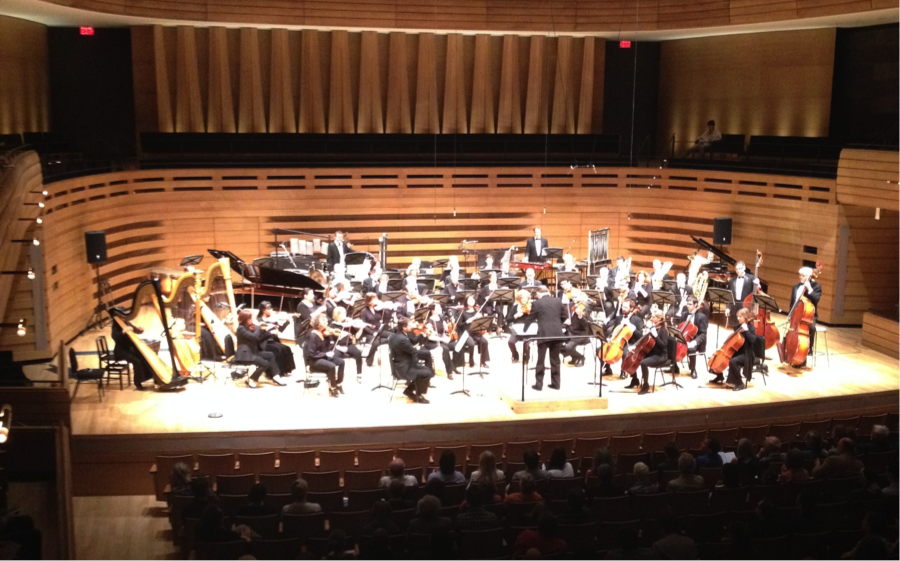Toronto’s Esprit orchestra delved into the land of mystery on Sunday night, marking the close of the first annual 21C Festival and the final concert of Esprit Orchestra’s 31st season at Koerner Hall. The concert included two newly commissioned works by young Canadian composers living abroad (Zosha Di Castri and Christopher Mayo), as well as works by England’s Mark-Anthony Turnage, and Dutch bon vivant Louis Andreissen.
Esprit has a long history of providing composers with a vehicle for trying out new works. They understand that for any art form to stay healthy, new works must be added to the canon on a regular basis. In our age of slacking tickets sales and diminishing numbers, this is no easy feat, but that hasn’t stopped RCM’s Executive Director Mervon Mehta’s vision for a new annual contemporary music festival. Pair that with Esprit Orchestra, one of Toronto’s most established new music orchestras, and you have the necessary champions that composers, (and new music), so dearly need.
Though the buzz was there, the musicianship superb, and the talent high, there were a few miss-steps on the programme.
Turnage’s Out of Black Dust, which enjoyed its Canadian premiere, is a short piece for ten brass players, and motivated by Led Zeppelin and, more directly, the composer’s friendship with the band’s bassist John Paul Jones and his wife. It features all the signature shades of Turnage’s accessible style – even the cowbells, which were traded off by various members of the ensemble. But despite Alex Pauk’s efforts to pull that magical something out of it, it lacked that rock-and-roll nous that Turnage is so typically to good at.
Canadian composer Di Castri’s new work “Serafiana” – inspired by an illustrated encyclopedia by Luigi Serafini: Codex Seraphinianus, was a fascinating piece. Di Castri described finding the book in the rare collections part of the library, and becoming enraptured over its complex world of detailed figures and made up language. It was a thoughtfully fused paradigm of pre-recorded and amplified violin, played by soloist Claudia Schaer, with the chamber orchestra at her back. The piece made use of grand pauses to dramatic effect, and included thwarts of strange glissandos and delicate pizzicati. While Castri’s piece was wonderfully imaginative and lovingly performed, Esprit seemed to struggle to understand it. I suspect some additional rehearsal was needed to more properly bring out the works complexities.
The clear stand-out of the night was Christopher Mayo’s Under Dark Water. According to the programme notes, the piece “sets the text of a short excerpt from Toby Litt’s 2001 novel deadkidsongs.” Mayo’s piece was economic in its orchestration and evocative of the Kindertotenlieder-themed texts. It began with an abrupt percussive gesture, and proceeded with three snare drums playing rhythmic figures with brush mallets, and a deep ‘thunk’ of a lone bass drum. The text was performed by four soloists from the Elmer Singers: soprano Gisele Kulak, mezzo-sopranos Amy Dodington and Andrea Ludwig, and alto Laura McAlpine. Both in style and delivery, it reminded me of a cross between Robert Ashley’s spoken word carriage, and David Lang’s fragmented yet lyrical vocal pieces. I’m looking forward to hearing more from Mayo in the future.
The concert closed with Louis Andriessen’s mature Mysteriën. This piece was Andriessen’s first orchestral work in 45 years and was inspired by 16th century writer Thomas a Kempis. It progressed through resolute block chords that expressed all the vanities of the world. It contained multiple rhythmic layers, each played with its own sense of time and space. Alex Pauk did a fine job of guiding the journey through its motions, leading to its final “mediation of death”.
Originally written for the Concertgebouw, this is an unusual turn against Andriessen’s typical jumpy and driving chamber pieces. It was also ironic for Andriessen, now in his 70’s, to be writing for an orchestra that he once protested against for not playing enough contemporary music. It was Hannah Arendt who once said, “The most radical revolutionary will become a conservative the day after the revolution.”
As with any new music concert, there are always going to be works that hit and miss. But with Esprit, and a strong determination to champion living composers both and home and abroad, we are given the opportunity to decide for ourselves what we do and don’t like. And after hearing the four pieces, and despite some minor missteps, it was an altogether fine close to the inauguration of one of Toronto’s most promising new contemporary music festivals.
Michael Vincent
- THE SCOOP | Royal Conservatory’s Dr. Peter Simon Awarded The Order Of Ontario - January 2, 2024
- THE SCOOP | Order of Canada Appointees Announced, Including Big Names From The Arts - December 29, 2023
- Ludwig Van Is Being Acquired By ZoomerMedia - June 12, 2023




